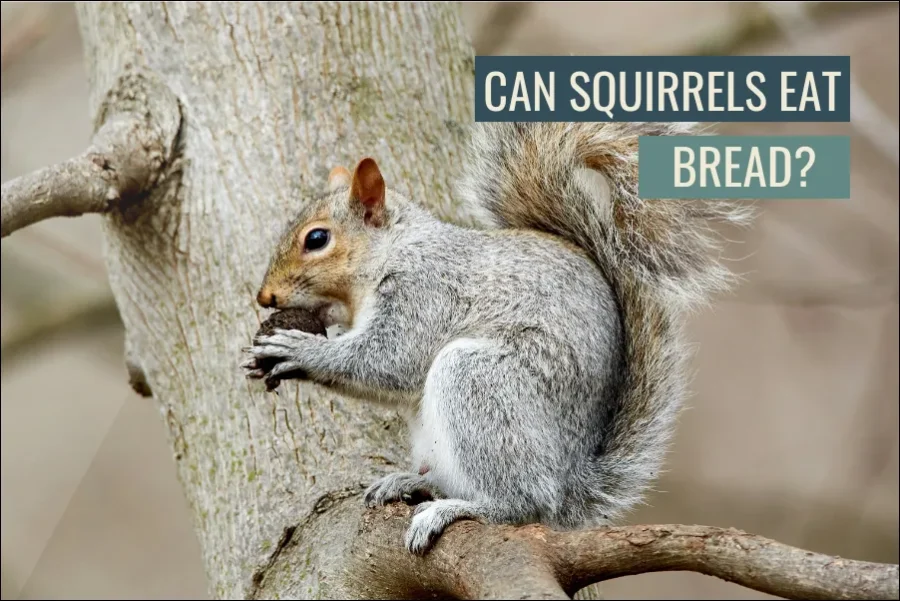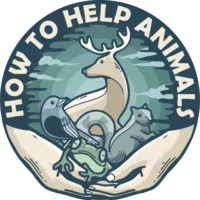
A family of squirrels scampers across your yard as you finish your morning toast. The urge to toss them some leftover bread crusts feels natural – after all, they look so eager and hungry. But before you share that slice, there’s something important you should know.
No, you should not feed bread to squirrels. While bread won’t immediately poison them, it offers no nutritional value and can cause serious health problems including malnutrition, digestive issues, and dependency on humans for food.
Why Bread Is Harmful to Squirrels
Bread lacks the essential nutrients that squirrels need to maintain their health and energy levels. Made primarily from processed flour and additives, bread provides empty calories that fill squirrels up without delivering the proteins, fats, and vitamins their bodies require.
Regular bread consumption can lead to malnutrition even when squirrels feel full. Their small stomachs become occupied with nutritionally void food, preventing them from seeking out the nuts, seeds, and natural foods that support their physiological needs.
The high carbohydrate content in bread can disrupt a squirrel’s natural blood sugar levels, potentially leading to energy crashes and metabolic stress. This is particularly dangerous for pregnant or nursing females who need consistent, high-quality nutrition.
Digestive Problems Caused by Bread
Squirrels’ digestive systems are designed to process nuts, seeds, fruits, and vegetation – not processed grains and additives found in bread. The refined flour in bread can cause digestive upset, including diarrhea and stomach discomfort.
Yeast used in bread production can continue fermenting in a squirrel’s digestive tract, causing painful gas buildup and bloating. This fermentation process can be especially problematic for young squirrels whose digestive systems are still developing. Grapes can be given occasionally, though they’re much higher in sugar than bread. These foods more closely match their natural diet and provide different nutritional benefits.
Preservatives and artificial ingredients commonly found in commercial bread can irritate sensitive squirrel digestive systems. These chemicals serve no nutritional purpose and may accumulate in their bodies over time.
The Dependency Problem
Regular bread feeding creates an unhealthy dependency where squirrels lose their natural foraging instincts. Instead of spending time searching for nutritious natural foods, they begin waiting for human handouts that don’t meet their dietary needs.
This dependency becomes particularly dangerous during winter months when squirrels should be relying on cached nuts and natural food stores. Bread-dependent squirrels may not have adequate fat reserves or food storage to survive cold periods.
Multiple generations can be affected, as adult squirrels may teach their offspring to seek human food instead of developing proper foraging skills helps break this cycle of dependency.
Bread vs. Healthy Squirrel Treats
Unlike bread, appropriate squirrel treats provide actual nutritional benefits. Fresh fruits like grapes offer natural sugars, vitamins, and hydration while remaining true to their dietary needs.
Unsalted nuts provide the high-fat, high-protein nutrition that squirrels naturally seek. Walnuts, almonds, and hazelnuts support their energy requirements and help build the fat reserves necessary for winter survival.
Seeds from sunflowers or pumpkins align with squirrels’ natural preferences while providing essential fatty acids and proteins. These foods encourage natural eating behaviors rather than creating artificial dependencies.
What About Different Types of Bread?
Whole grain breads, while slightly more nutritious than white bread, still pose the same fundamental problems for squirrels. The processing involved in bread making removes most natural nutrients and adds ingredients that squirrels’ systems aren’t designed to handle.
Moldy bread presents additional serious health risks, as certain molds can be toxic to wildlife. Never offer any bread that shows signs of mold growth, as this can cause severe illness or death in squirrels.
Sweet breads and pastries contain even higher sugar levels and additional artificial ingredients that compound the negative effects. These products are particularly harmful and should never be offered to any wildlife. Peanut butter can be offered in similar moderation, though it’s much higher in fat and protein than bread.
Signs of Poor Nutrition in Squirrels
Squirrels fed primarily bread and other inappropriate foods often develop visible health problems. A dull, patchy coat may indicate nutritional deficiencies that proper foods could prevent.
Lethargy and reduced activity levels can signal that a squirrel isn’t receiving adequate nutrition for their high-energy lifestyle. Healthy squirrels remain active and alert throughout their normal daily routines.
Difficulty with normal behaviors like climbing or jumping may indicate muscle weakness from inadequate protein intake. Proper nutrition supports all aspects of squirrel health and natural behaviors.
Better Ways to Help Squirrels
Instead of bread, focus on creating environments that support squirrels’ natural food-finding abilities. Planting nut trees or berry bushes provides long-term food sources that don’t create dependency.
Fresh water sources benefit squirrels more than food handouts, especially during dry periods when natural water may be scarce. Clean bird baths or shallow dishes help meet this essential need.
Leaving natural materials like leaves and twigs available helps squirrels build proper nests and shelters. This type of assistance supports their well-being without interfering with natural behaviors.
Teaching Others About Proper Squirrel Care
Many people feed bread to squirrels out of genuine care but lack knowledge about wildlife nutrition. Sharing information about appropriate foods helps protect entire neighborhood squirrel populations.
Children especially benefit from learning about wildlife nutrition, as early education creates lifelong conservation awareness. Teaching kids about seasonal squirrel needs builds respect for natural ecosystems.
Community education efforts can transform well-meaning but harmful feeding practices into genuine wildlife support that benefits local squirrel populations for generations.
Creating Squirrel-Friendly Landscapes
Long-term squirrel welfare depends more on habitat than handouts. Native plants that produce nuts, seeds, and berries create sustainable food sources that support healthy squirrel populations naturally.
Avoiding pesticides and chemicals in areas where squirrels forage protects their health and ensures that natural food sources remain safe and nutritious.
Understanding natural squirrel behaviors around food helps create environments that support rather than interfere with their evolved survival strategies.
The Nutritional Science Behind Why Bread Fails Squirrels
Understanding the specific nutritional requirements of squirrels reveals why bread falls so short of their dietary needs. Squirrels require approximately 35-40% of their calories from fat, 20-25% from protein, and the remainder from complex carbohydrates found in natural sources.
Bread typically contains less than 5% fat and only 8-12% protein, creating a massive nutritional imbalance when it becomes a regular food source. The carbohydrates in bread are simple, processed sugars that provide quick energy spikes followed by crashes, unlike the sustained energy from natural foods.
Essential amino acids found in nuts and seeds are completely absent from bread, yet these building blocks are crucial for muscle development, immune function, and overall health. Without these nutrients, squirrels may appear healthy initially but develop serious deficiencies over time.
Vitamins A, D, and E – critical for squirrel vision, bone health, and reproductive success – are either missing or present in negligible amounts in bread. Natural foods like acorns and walnuts provide these vitamins in bioavailable forms that squirrel bodies can readily utilize.
Long-term Population Effects of Bread Feeding
When entire neighborhoods regularly feed bread to squirrels, the effects extend beyond individual animals to impact local population dynamics. Malnourished females produce fewer offspring and may have difficulty nursing their young successfully.
Territorial behaviors can become disrupted when squirrels congregate around human food sources instead of maintaining natural home ranges. This concentration can lead to increased aggression, stress, and the rapid spread of diseases through dense populations.
Urban squirrel populations fed primarily on bread and other inappropriate foods often show reduced genetic diversity over time, as weaker individuals may still survive to reproduce thanks to easy food access, but pass on compromised health traits to offspring.
The ripple effects impact entire ecosystems, as squirrels play important roles in seed dispersal and forest regeneration. Unhealthy squirrel populations may fail to cache nuts effectively, reducing their contribution to natural reforestation processes.
Environmental Consequences of Improper Feeding
Bread feeding creates environmental problems beyond squirrel health concerns. Leftover bread attracts rats, pigeons, and other urban pests that can create sanitation and public health issues in residential areas.
Fermented bread in outdoor environments can contaminate soil and water sources, affecting the entire local ecosystem. The high sodium content in many breads can alter soil chemistry when repeatedly deposited in the same feeding locations.
Weather conditions affect bread differently than natural foods – rain can create moldy, toxic feeding sites that persist for days, while natural foods either decompose safely or are quickly consumed by appropriate wildlife species.
The accumulation of bread waste in parks and yards can discourage natural plant growth, reducing the availability of native food sources that would better support local wildlife populations in sustainable ways.
